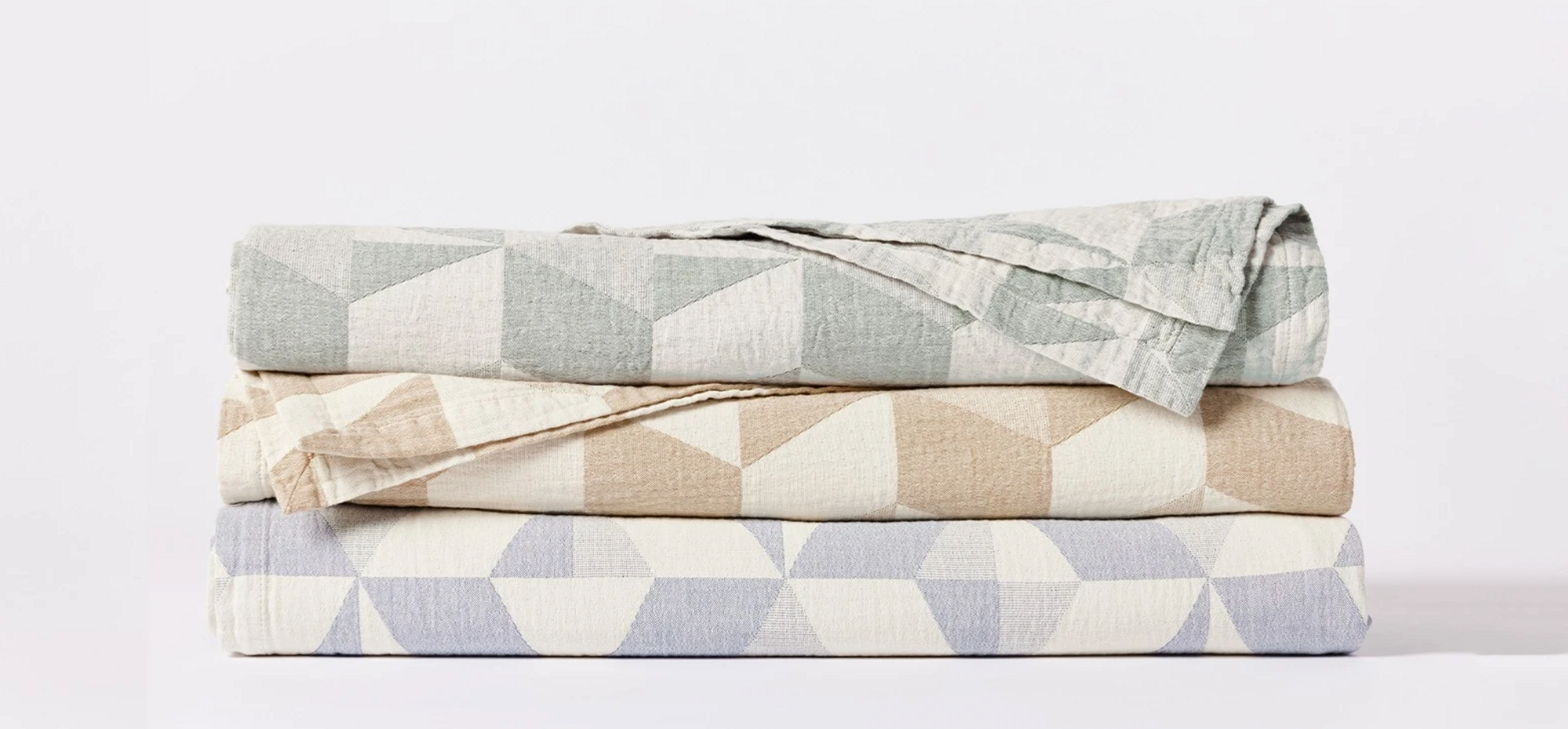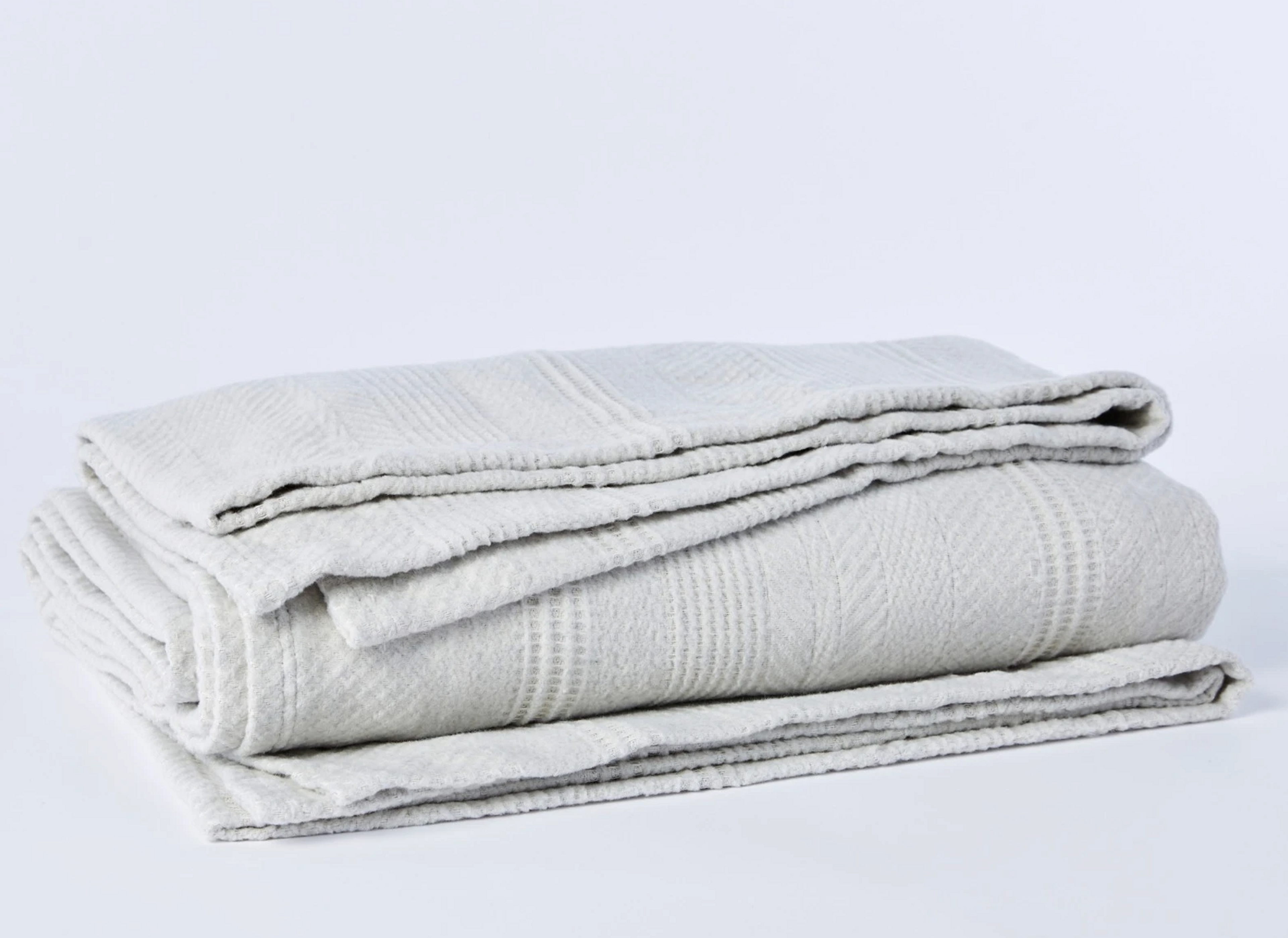
Coyuchi has been producing textiles made with organic cotton and putting sustainable innovation at the forefront of its work since 1991. It was the first company to bring organic home linens to market, the first home brand to release a fully circular product, and it leads the textile industry in climate action through re-commerce, and regenerative agriculture.
In the thirty years since its inception, Coyuchi has translated its sustainability commitment into a comprehensive climate program. Its climate goals are now informing future product development, setting a bar for other home brands, and creating a multiplying effect in their supply chain.
Challenge: Mapping a path to net zero
In 2022, Coyuchi used a framework provided by the Sustainable Food Trade Association to create its first climate action plan, leading to its pledge to be net zero by 2025 and net positive by 2030––a goal to create an environmental benefit by removing additional carbon dioxide from the atmosphere.
Coyuchi had a long history of innovations in sustainability, but was missing three key elements to execute its ambitious climate plan:
- Footprint data to set a baseline for demonstrating progress toward targets
- Climate expertise to guide and optimize post-measurement decision-making
- A plan to integrate carbon offsets
“We are in the home business, so our team knows how to make great textiles for bedding and running an e-commerce business, but we are not experts on carbon emissions. With our emissions data, we wanted to know where we could go next and what we could do with it.”
Eileen Mockus,
CEO
Solution: A data-backed roadmap for action
Coyuchi implemented Watershed in mid-2022 to re-establish its baseline footprint to be more comprehensive and actionable. With Watershed, Coyuchi gets climate intelligence that helps build its authenticity as a brand. In particular, the team finds value in:
- Product-level insights: “Watershed’s support and tools help us measure our impact and make reductions. Using insights from the [Product-level Insights] module, we are evolving the way we assess suppliers and looking at ways we can design and manufacture products in less carbon-emissive ways than before.” - Marcus Chung, COO
- Data to support sustainability-focused marketing: “Consumers gravitate towards stories about how items are made and how that impacts people, biodiversity, and the planet. The data we get from Watershed allows us to talk about what we’re doing and why it matters––with real numbers.” -Eileen Mockus
- Access to a marketplace of vetted and high quality carbon avoidance and removal: “We know that carbon reduction is the ultimate goal, but we are also cognizant of the role that offsets and insets will play. They are a part of a practical solution for what our next steps may look like.” -Eileen Mockus

Insights: Simulating reductions to identify maximum impact
Coyuchi has found opportunities to lower its carbon footprint in everyday strategic and operational decision making. Using Watershed’s Simulation Tool, the company can easily visualize emissions nuances between different business scenarios. Coycuchi’s team called out two specific simulations they’ve modeled recently:
- The impact of dyeing vs. not dyeing textiles: Coyuchi has always offered un-dyed textiles, which it knew was less-emissive. (The natural color of its cotton is also a beautiful shade of ivory that is very popular.)
- Using Watershed, it determined that un-dyed cotton was 43% less emissive than dyed—a concrete detail for consideration in future product development, or to expose to the consumer.
- Sourcing renewable energy to power its manufacturing: Coyuchi wants to make decisions that will have the biggest (climate) bang for its buck. In the development phase of its Full Circle Recycled Cotton Throw, Coyuchi was exploring whether using recycled fabrics would be less emissive than virgin fabrics.
- Using Watershed, they modeled the impact of using clean power for their factories, and discovered that fabric choice was far less important than power source—in fact, while recycled fabrics could cut emissions by 10%, switching to clean power would decrease emissions by over 60%.
“Without the detailed data that Watershed provides, we wouldn’t have been able to easily model scenarios that now guide our business decisions.”
Eileen Mockus,
CEO
Result: A lower-carbon supply chain for the entire industry
With Watershed’s help, Coyuchi has developed a roadmap for its climate work that sets forth a realistic and accurate path to net zero. According to Mockus, “We acknowledge that there’s risk associated with committing to a certain date, but there’s also an opportunity to learn and to set the bar high to drive the appropriate urgency towards meeting these goals.”
Influencing its supply chain will have a network effect elsewhere in the home goods industry as well.
“Our vendors are embracing sustainability work and helping us drive change. I love this because it also impacts other brands that might not have the same climate goals but operate in the same factories.”
Eileen Mockus,
CEO
For example, “The water used to process their goods is being recycled based on our request and the renewable energy benefits their emissions too,” Mockus expanded. “Those moments remind me that this work is bigger than any one company.”